
Monday August 24, 2020
By Silvia Foster-Frau
Photos by Bob Owen
Thousands of refugees and immigrants working for huge plants in the Panhandle were repeatedly exposed to coronavirus after the plants were deemed essential and ordered by President Trump to remain open.
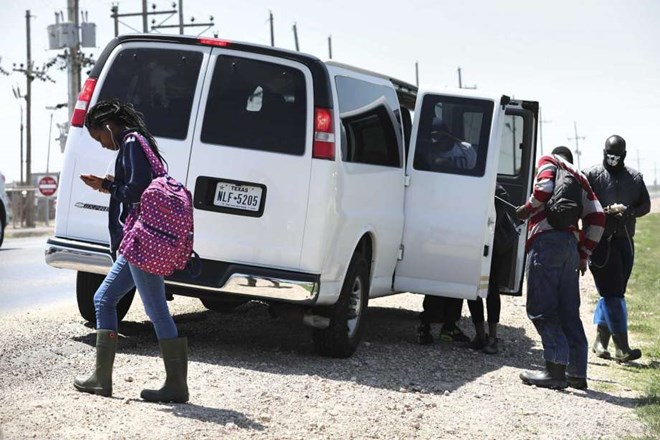
The JBS Beef meatpacking plant has about 3,000 employees — nearly the size of the town itself. Every day, immigrants and refugees arrive at the plant to slaughter and package meat.
CACTUS — They came by the thousands in search of jobs and a haven, and in the meatpacking plants of the Texas Panhandle, they found both. The work was grueling, but the pay was good, and they felt safe.
Then a new danger reared its head. The crowded plants became petri dishes for the novel coronavirus. In May, the region had the highest infection rate in Texas. Hundreds of cases were tied to the plants.
Gov. Greg Abbott sent health-care specialists to the Panhandle to test workers and stem the outbreak. More than three months later, the workers still are struggling with the effects of the pandemic and the persistent fear of contracting the disease.
Many are refugees from civil conflicts in Africa, Asia and Central America. Now, they face a choice between working arduous shifts in close quarters — or quitting and losing their only source of income.
“Everybody is getting sick — everybody,” said Fadumo Osman, 58, a refugee from Somalia who packages meat on the “C shift” — from midnight until morning — at a Tyson Foods plant in Amarillo. “That’s why in Texas, coronavirus hasn’t stopped. They look at your job, look at your money, first.”
The companies say they have improved social distancing and other safety measures, but legal aid groups have pointed to gaps in their protocols. Most notably, when employees who may have been exposed to COVID-19 are tested for the virus, they’re expected to continue working while they await the results — potentially infecting others in the meantime.
The JBS Beef meatpacking plant has about 3,000 employees — nearly the size of the town itself. Every day, immigrants and refugees arrive at the plant to slaughter and package meat.
“These plants were the nucleus of the community outbreak in the Panhandle,” said Chris Benoit, an attorney with Texas RioGrande Legal Aid, who is seeking back wages for a worker at the JBS Beef plant in Cactus who contracted the coronavirus.
“You have a very isolated facility in an isolated part of Texas with a workforce that speaks multiple languages,” Benoit said. “That compounds the difficulties of making sure all workers are safe.”
President Donald Trump in May ordered meatpacking plants to stay open, labeling them essential services, and the Occupational Safety and Health Administration and the Centers for Disease Control and Prevention issued voluntary safety guidelines for the plants.
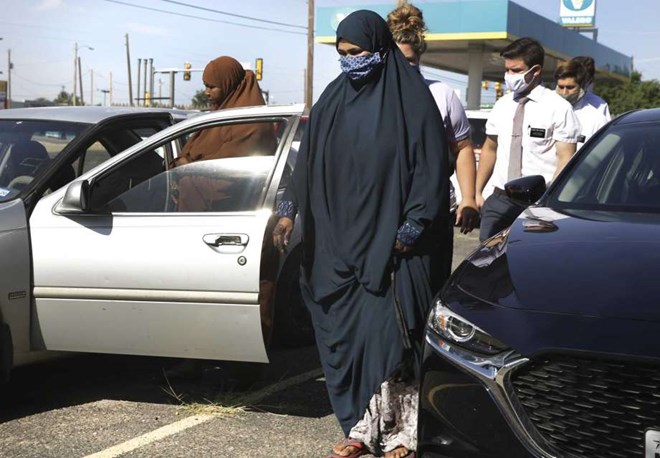
More than 1,500 workers at the Tyson plant in Amarillo tested positive that month for coronavirus. Some 323 tested positive at JBS Beef — nearly 10 percent of the population of Cactus. The plants did not respond to repeated requests for updated figures. Nor did city, county or state officials.
In all, 1,648 coronavirus cases and at least nine deaths have been tied to Texas meatpacking plants, according to the Midwest Center for Investigative Reporting. Nationwide, more than 36,400 positive cases and 165 worker deaths have been linked to the plants, according to the center.
In June, JBS Beef adopted a “vulnerable population policy” that allows at-risk workers to take leave with full pay and benefits, the company said in a statement. Some of them returned to work in late July. The plant is working at “slightly reduced capacity” and is randomly testing workers twice a week.
Tyson Foods said it has tested nearly a third of its workforce, and it recently created a chief medical officer position. The company said it will hire 200 more medical personnel and will test workers weekly at its more than 140 plants around the country. Tyson said in a statement that “we currently have very few active cases” at the Amarillo facility.
Fear of retribution by employers is common among the workers. Many spoke on condition that their last names not be published.
“They don’t listen to us. If you say something bad, te corren” — they fire you, said Silvia Gomez, a Mexican immigrant who works at JBS. “They mistreat you a lot. They don’t like me because I do talk — because I’m 70 and I don’t care.”
A company town
The three letters “JBS” on the biggest building in Cactus are recognized across languages and cultures.
The lives of hundreds of refugees here are deeply intertwined with JBS, which employs nearly as many workers as there are residents of Cactus (3,200).
The massive plant is where some of the workers met their spouses. It’s the reason scars pepper their fingers and hands. It’s where they are learning English. The company owns many of the apartments they rent.
“It’s good money, but it’s too hard for a long time,” Murwanashyaka Mucyuranyana, a Congolese man who goes by Alan, said in labored English.
He slices into cattle heads on the assembly line. He wakes up in the morning with cramped hands from gripping a knife for hours on end. He runs warm water over his fingers to loosen them up.
Congolese, Burmese, Somalis, Eritreans, Guatemalans and other refugees come to Cactus for work, often through the Catholic Charities of Amarillo refugee program.
They settle into trailer homes and apartments for a chance to make a starting wage of $18 an hour - well above the minimum wage of $7.25 paid by many American factories. JBS owns 156 apartment units in Cactus and has begun construction on 240 more.
The tiny town is a small United Nations. More than half the population is foreign-born, and 81 percent speak a language other than English at home, according to the U.S. Census Bureau.
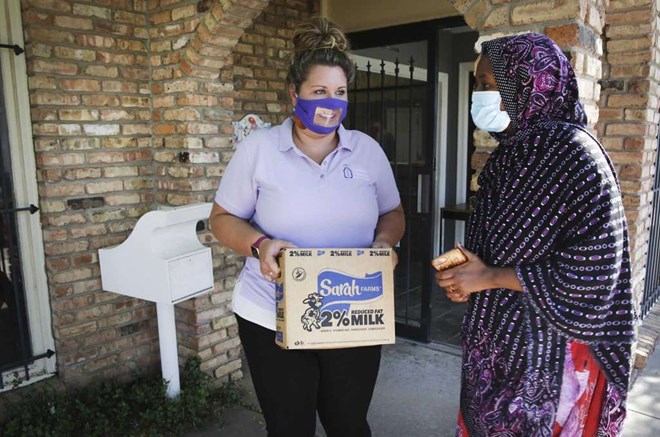
Eight-hour shifts at JBS are exhausting. The cutting work is considered the hardest and pays better than cleaning and packaging.
“I’ve got to cut this side, and then I’ve got to cut this side, and then I pass it on,” said Fikiria Nyawenda, 19, of Tanzania, motioning to demonstrate how he splits the heads of cows.
“If I don’t pass it quick, it piles up. If my life is not going good, I have a lot of cow heads in front of me,” he said with a chuckle.
Most of the refugees spent years in refugee camps before being allowed entry into the U.S. As members of persecuted groups, they often witnessed violence up-close.
When Alan was about 10 years old and living in the Congo, his parents and siblings were killed — burned alive. He fled to a refugee camp in Rwanda, where he lived for 15 years before he was selected by the U.S. State Department to resettle in Cactus about two years ago.
He likes to sleep on the carpeted floor of his JBS-owned apartment with a blanket and pillow - it reminds him of the refugee camp. He eats lots of beans, a staple at the camp, and he relishes white rice, which wasn’t available there.
In Cactus, about 60 miles north of Amarillo, he found a community that — on the surface at least — fit the clichés about conservative rural Texas. Seventy-five percent of voters in Moore County voted for President Donald Trump in 2016.
The reality is more nuanced.
“It is a unique community here. It has its charm,” said Phil Anderson, executive director of the Cactus Nazarene Ministry Center, one of the only social service programs in town. JBS pays the center to give English classes to its workers.
“It’s quiet and safe, and it’s so culturally diverse. If you stop and chat with someone on the street, you never know where people will be from,” he said.
Cactus has not always been a sanctuary for migrants. U.S. Immigration and Customs Enforcement raided the town in 2006 and arrested about 300 undocumented workers. Today, JBS and other large companies increasingly hire legal refugees, while many of those who work in the surrounding fields are undocumented immigrants, often from Mexico or Guatemala.
In 2007, a tornado damaged more than a third of the buildings in Cactus. Some trailers and homes still bear spray-painted markings indicating they were condemned. One reads “Surv x3,” meaning three family members survived the storm.
Now, more than a decade later, Cactus is reeling from one of the worst coronavirus outbreaks in Texas.
In a complaint filed with OSHA in May, Texas RioGrande Legal Aid contends that JBS Beef - in violation of federal safety guidelines — does not space workers six or more feet apart on the slaughter line, on company buses that transport workers to the plant or during breaks. As a result, workers are sometimes crowded “shoulder-to-shoulder,” the group said.
Texas RioGrande requested an OSHA inspection of the plant. The group said none has been conducted.
JBS disputed the allegations. In a statement, the company said: “We are following, and often times exceeding, all CDC- and OSHA-issued guidance around safety and social distancing.”
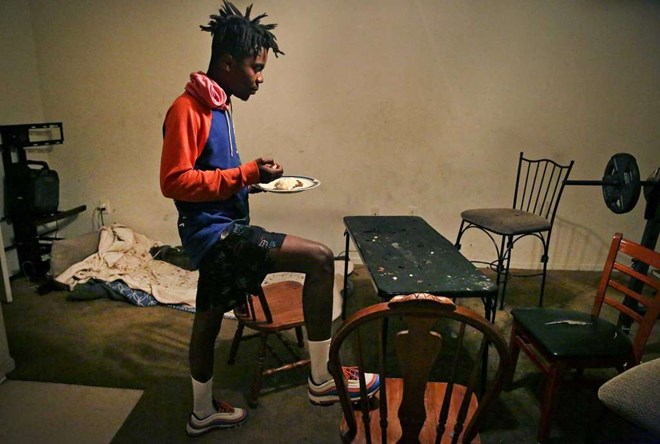
Many of the refugees still cook meals from their home country. Juscar, 19, and his friend Murwanashyaka Mucyuranyana made the traditional African dish fufu with chicken.
JBS said all employees are given temperature checks before entering the plant and must wear masks and face shields. The company said it deep-cleans the plant every day and has placed dividers in common areas and on the production floor; staggered shifts and breaks; installed high-tech air-purification systems; and waived waiting periods for short-term disability benefits.
Though advocacy groups and Democratic lawmakers have criticized the company for remaining open during the pandemic, the refugees are grateful for the work.
“They told us ‘JBS will never close.’ No matter what, they’ll never close. ‘Because you’re feeding America,’” said Juscar Safari, 19, a Congolese refugee. “It felt good, because I want my people to eat.”
Despite the close working conditions and the outbreak, he said he was unafraid of the coronavirus.
“We’ve been through Ebola, lots of stuff. So corona, for us Africans, we get scared, but not as much as other people,” he said. “We have to work and make money.”
Nyawenda said the same. Cactus and the work at JBS are better than what his family fled in Tanzania.
“We’ve seen family die in our own hands. We know we don’t have long to live, either, so we try to make money while we can,” he said. “We’ve been through a lot of stuff. We have a war almost every day in our country, so we basically don’t care if we die or don’t die.”
Sandai is a soft-spoken Burmese woman who doesn’t speak English except for a few words learned at the plant: “B shift,” “kill line.” She lives in an apartment near the center of town, with a garden where she grows vegetables. Her neighbors are family members.
Asked about coronavirus at the plant, she said through a translator: “There’s no fear, only Allah.”
Spreading infection
The nature of meatpacking work creates an elevated risk of exposure to the coronavirus, the CDC and OSHA noted in their safety guidance for the industry.
Chief among the risk factors: “Prolonged closeness to coworkers.” Employees stand side-by-side on processing lines for hours on end. They share break and changing rooms and are sometimes driven to work together in vans. After their shifts, they often return to the same neighborhoods, contributing to “ongoing community transmission.”
An outbreak at Tyson Foods in Amarillo spread quickly in April and May and made national headlines. Yet employees who did not have symptoms were expected to work after they were tested for the virus — and before they received the results. Tyson confirmed that this is its standard procedure for asymptomatic employees.
Osman, the Somali refugee, said she tested positive on April 22 and stayed home for two weeks under Tyson’s sick-pay policy. On May 7, she was required to go back to work.
One or two days later, she was tested again. She continued working while she waited for the result. On May 15, she found out: positive. She was sent home.
“How many people did I give it to — can you imagine?” Osman said.
The Tyson Foods plant, which processes beef products, stands near a school in the northeastern outskirts of Amarillo. Driving to the plant from downtown, workers pass a bright yellow-and-red Buddhist temple before reaching the gray- and dark-green brick of the plant.
Several workers there said they were still waiting to collect pay from when they were out sick with the coronavirus. Catholic Charities staff has heard similar complaints.
Rebecca Rodriguez, 58, stayed home from work in April and May because she was afraid of contracting the virus and infecting her children. When she returned to work, she said the company paid her for two of the weeks she was gone.
“I was so scared to come back here, because everybody got the disease. Everybody in my line got the disease,” she said, speaking in the Tyson Foods parking lot after finishing her shift. “And I was angry because I saw one of my friends was very, very sick.”
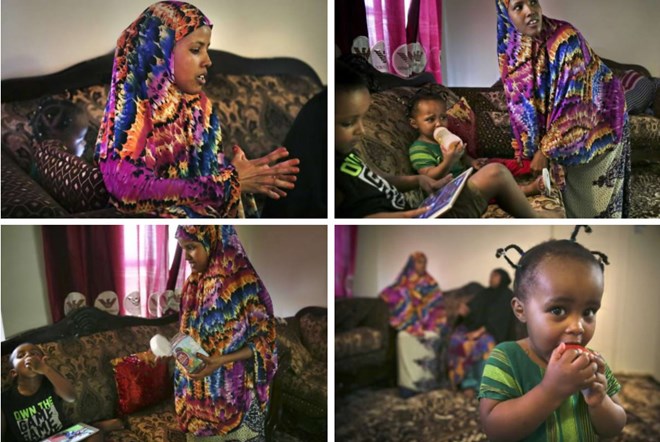
‘Maybe I will die’
It was midday and Halimo Muhamed was preparing thick, creamy macaroni-and-cheese for her children, ages 2 and 6, in her Amarillo apartment. It’s decorated with colorful, patterned rugs that match her hijab and skirt.
A refugee from Somalia, she quit her job at Tyson Foods two weeks ago because of the spread of coronavirus there. She said she tested positive at the end of April, recovered and returned to work — only to suffer relapses twice.
“I finally decided I was going to stay home,” said Muhamed, 28. “I was scared for my babies. A lot of people were sick.”
She said her babysitter contracted the virus. Several neighbors did, too, along with more than 20 people she knew at work.
Muhamed fled Somalia two years ago. Her uncle was killed when she was a child, and her family lived in perpetual danger. Most of them still do.
“Every day my mom worried” when she and her siblings went to school, she said. “But every day we came back.”
She sends $200 a month to her family. She’s worried about the future. As a single mother without a job, she’s not sure how she’s going to pay the bills.
“Sometimes it’s nobody’s fault. But sometimes it’s the beef company that can do more for safety. But they don’t care. Especially at Tyson, they don’t care,” Muhamed said. “They say ‘First is family,’ but it’s not, because a lot of people are still getting sick.”
Silvia Foster-Frau covers immigration news in the San Antonio, Bexar County and South Texas area. To read more from Silvia, become a subscriber. sfosterfrau@express-news.net | Twitter: @SilviaElenaFF
Graphics by Ryan Serpico
Design by Chris Quinn